|
|
|
Sort Order |
|
|
|
Items / Page
|
|
|
|
|
|
|
| Srl | Item |
| 1 |
ID:
096526
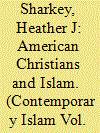

|
|
|
| 2 |
ID:
086644
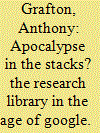

|
|
|
|
|
| Publication |
2009.
|
| Summary/Abstract |
Research libraries take up a vast amount of physical and psychic space.They inhabit spectacular buildings, old and new, which occupy prime real estate in cities and on campuses.
|
|
|
|
|
|
|
|
|
|
|
|
|
|
|
|
| 3 |
ID:
148928
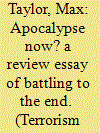

|
|
|
| 4 |
ID:
172342
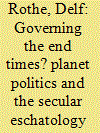

|
|
|
|
|
| Summary/Abstract |
This article furthers the debate on the political implications of the Anthropocene – the most recent geological epoch marked by catastrophic environmental change – by engaging it through the lens of political theology. The article starts from the observation that discourses on the Anthropocene and related political projects are deeply influenced by a linear temporality and a common orientation towards the threat of the end of time. It distinguishes three competing discourses of the Anthropocene, eco-catastrophism, eco-modernism and planetary realism. The article analyses how these discourses invoke and update key symbols, images, and storylines of Christian political theology. Furthermore, it studies how each discourse mobilises these secularised Christian motifs to promote competing planet political projects. Each of these projects develops a different position towards the unfolding planetary crisis and the related threat of the end of time. Eco-catastrophism calls for a planetary emergency management, eco-modernism promotes ongoing experimentation with the planet, whereas planetary realism translates into what could be called a ‘realpolitik of resilience’. Revealing the Western theological roots of the Anthropocene and planet politics is essential if the emerging literature on the Anthropocene wants to live up to its promise of pluralising and decolonising IR.
|
|
|
|
|
|
|
|
|
|
|
|
|
|
|
|
| 5 |
ID:
139033
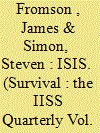

|
|
|
|
|
| Summary/Abstract |
The American-led coalition has reached a turning point in the battle against the Islamic State of Iraq and al-Sham (ISIS). Where previously the campaign was framed in defensive terms – the need to protect Iraqi minorities and prevent the fall of Baghdad and Erbil – the emerging narrative in Washington now centres on a well-advertised ground offensive to retake the ISIS stronghold of Mosul and, implicitly, to break the organisation’s back. The time is ripe for strategic reassessment – or, perhaps more accurately, an open-source assessment that did not occur during the first rush to action in summer 2014.
|
|
|
|
|
|
|
|
|
|
|
|
|
|
|
|
| 6 |
ID:
165633
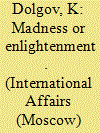

|
|
|
|
|
| Summary/Abstract |
THE OBSERVABLE HISTORY of humankind shows that it has on many occasions, for intrinsic or extrinsic reasons, teetered on the brink of destruction - and the same holds true for all living things and the planet itself. Long before the advent of the Apocalypse, people have feared for their lives and the fate of the Earth. Scientists have identified several such periods in history (like the extinction of the dinosaurs) when there could have been universal catastrophe. Now scientists acknowledge that we have entered a sixth period (starting in 1945, when nuclear weapons appeared and were used, and the Anthropocene era began).
|
|
|
|
|
|
|
|
|
|
|
|
|
|
|
|
| 7 |
ID:
098370
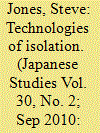

|
|
|
|
|
| Publication |
2010.
|
| Summary/Abstract |
In this investigation of the Japanese film Kairo, I contemplate how the horrors present in the film relate to the issue of self, by examining a number of interlocking motifs. These include thematic foci on disease and technology which are more intimately and inwardly focused that the film's conclusion first appears to suggest. The true horror here, I argue, is ontological: centred on the self and its divorcing from the exterior world, especially founded in an increased use of and reliance on communicative technologies. I contend that these concerns are manifested in Kairo by presenting the spread of technology as disease-like, infecting the city and the individuals who are isolated and imprisoned by their urban environment. Finally, I investigate the meanings of the apocalypse, expounding how it may be read as hopeful for the future rather than indicative of failure or doom.
|
|
|
|
|
|
|
|
|
|
|
|
|
|
|
|
| 8 |
ID:
144925
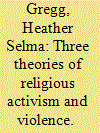

|
|
|
|
|
| Summary/Abstract |
Numerous scholars have investigated religiously motivated violence, particularly in the wake of September 11, including discussions on the role of modernity in triggering religious violence, the increasing presence of religion in politics, the violence-prone nature of certain religions, and religion's correlation with ethnicity and other conflict-intensifying variables. However, religious activism and violence are not new phenomena. Few theories have been advanced that move across time and space and, broadly, seek to explain the conditions under which religion becomes involved in activism and violence. This article argues that three broad causal arguments for religious activism—social movements, fundamentalism, and apocalyptic warriors—help explain the conditions under which religiously motivated violence occurs across time and space. These three causal arguments offer a spectrum of goals within religious activism, ranging from challenging social practices and government policies, to defending specific interpretations and practices of the faith, to hastening the apocalypse. Furthermore, each of these theories proposes different ways that religion becomes involved in social, political, and religious activism and the conditions under which groups use violence to further their goals. The article concludes by suggesting countermeasures for each type of religious activism.
|
|
|
|
|
|
|
|
|
|
|
|
|
|
|
|
| 9 |
ID:
175166
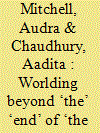

|
|
|
|
|
| Summary/Abstract |
We often hear that the ‘end of the world’ is approaching – but whose world, exactly, is expected to end? Over the last several decades, a popular and influential literature has emerged, in International Relations (IR), social sciences, and in popular culture, on subjects such as ‘human extinction’, ‘global catastrophic risks’, and eco-apocalypse. Written by scientists, political scientists, and journalists for wide public audiences,1 this genre diagnoses what it considers the most serious global threats and offers strategies to protect the future of ‘humanity’. This article will critically engage this genre to two ends: first, we aim to show that the present apocalyptic narratives embed a series of problematic assumptions which reveal that they are motivated not by a general concern with futures but rather with the task of securing white futures. Second, we seek to highlight how visions drawn from Black, Indigenous and People of Color (BIPOC) futurisms reimagine more just and vibrant futures.
|
|
|
|
|
|
|
|
|
|
|
|
|
|
|
|
|
|
|
|
|